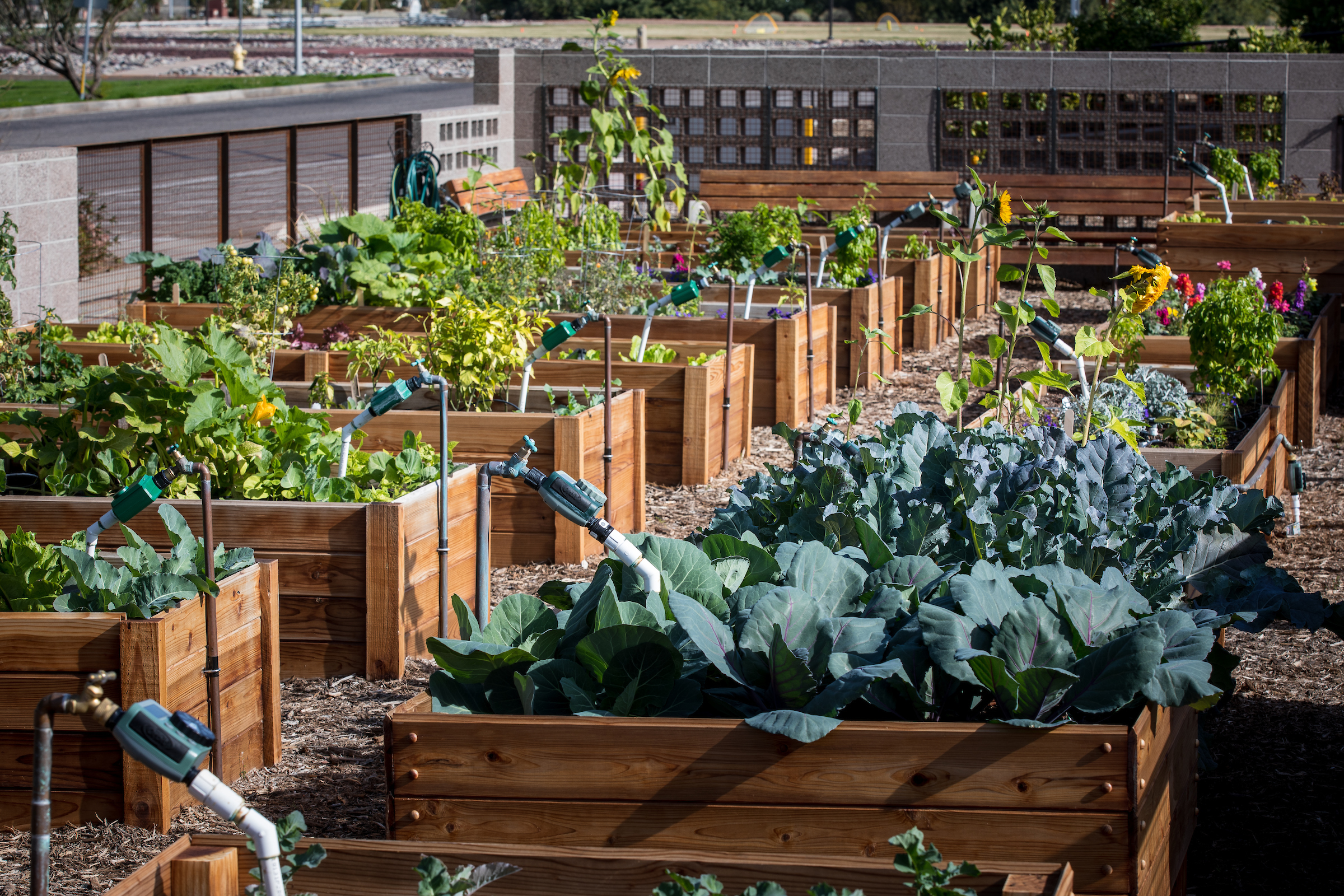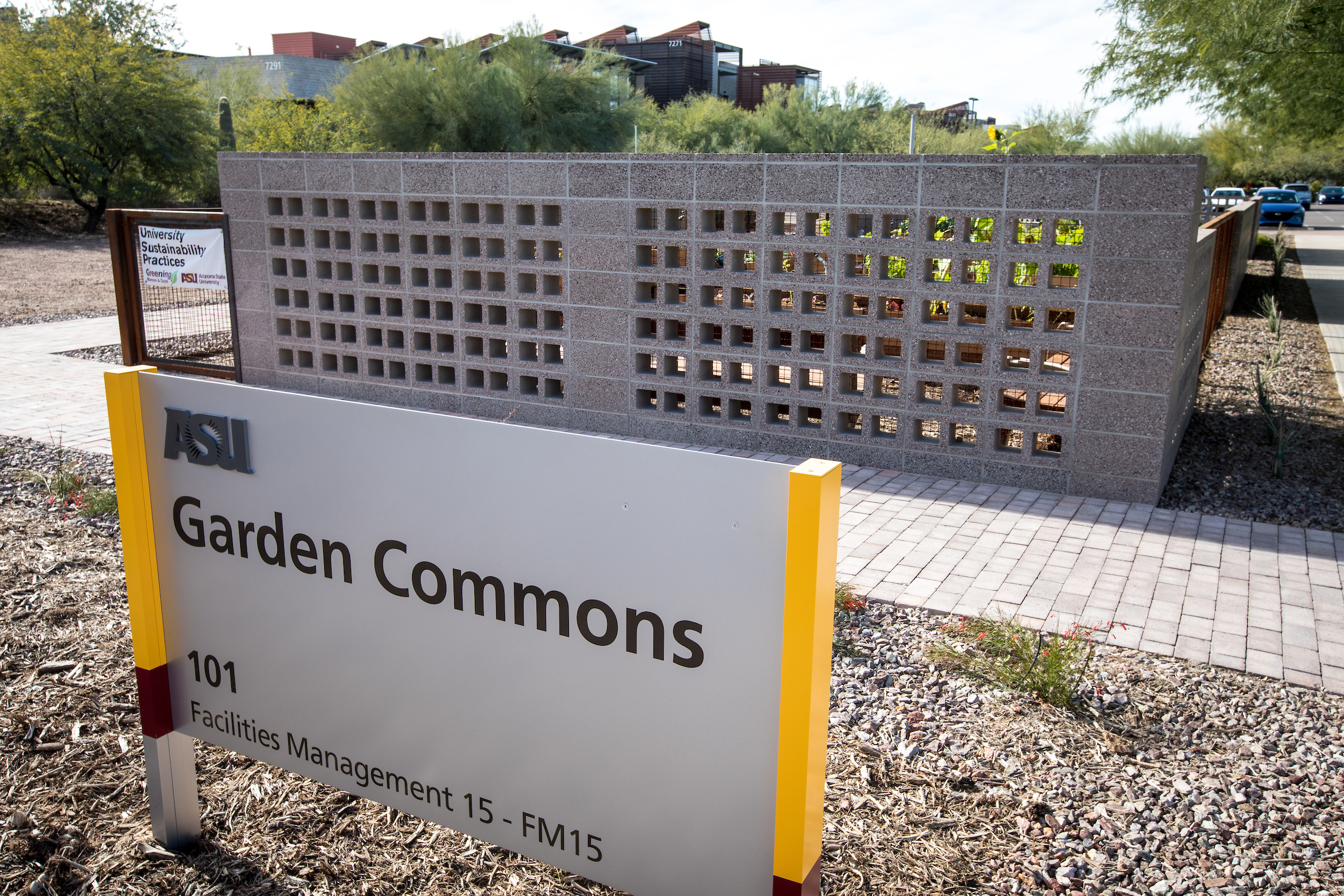Thomas Jefferson said, “No occupation is so delightful to me as the culture of the earth, and no culture comparable to that of the garden.”
There’s plenty of delight to be found in the relocated and revamped community garden on Arizona State University’s Polytechnic campus. Recently moved from an older site on the edges of campus, the garden is now in the heart of everything.
Lettuce, flowers, vegetables and fruit trees sit in orderly rows, attracting bees from a lab on the other side of campus. The garden looks spectacular, like a professional nursery. Here you can find basil, broccoli, jalapeños, spinach, zucchini, chard and cabbage, among many other varieties.
Possibilities for the table are endless. Ratatouille, quiche or the “most amazing salad ever,” said Susan Norton, program coordinator with University Sustainability Practices.
The Poly garden is similar to other community gardens and features numerous beds growing vegetables, edible flowers and plants that attract pollinators. Photo by Charlie Leight/ASU Now
The garden consists of an indoor learning center, a small orchard, grow spaces and an outdoor event space. All of it was constructed with sustainability in mind: recycled bricks, a renovated building and 100% diversion from landfills.
More grow spaces, a meditation space and a grand entry are planned. Norton is working on a proposal for costs for future phases. When complete, it will be ideal for weddings or community events.
Norton also teaches a phys ed class called Physical Activity in the Garden through the Mary Lou Fulton Teachers College. (The class is also offered on the Tempe campus.) There’s about 10 minutes of a lesson, then it’s outside to get to work. The workload ranges from heavy — swapping out beds — to easy — planting seedlings. Students from first-years to seniors, and from all fields, take the class. Getting outside, getting their hands dirty and using a different part of their brain is a huge draw.
“A lot of engineering students want stress relief,” she said. “They just want a class where they don’t have to crunch numbers and be in front of a computer. … Business students are here for kind of the same thing: more of a break.”
For international students, gardening is a comfortable activity.
“I’ve had a fair number say, ‘I used to garden with my grandpa. I really miss him. He taught me a lot. I wanted to take this class to feel connected to him.’ Sometimes it’s regional, too. They want to see if they can grow things from their country here,” Norton said.
Eggplant is popular with international students. A white eggplant from Japan was grown. One student grew quinoa. “He did a phenomenal job,” Norton said. “Quinoa grew quite well.”
Anyone taking the class can take home food. It’s a seven-week class, so it can be challenging to get a crop in that time, but Norton plants a few starter vegetables so students can take things home without waiting too long. They’re also welcome to come in the following semester to pick produce.
The garden has a prime location near the student union on the Polytechnic campus. Photo by Charlie Leight/ASU Now
The garden grew from the success of the old community garden, which was located near the housing on the south end of the Poly campus for about six years. But the old garden didn’t have great shade and was too far from the main part of campus.
“I thought about what makes a really great community garden,” Norton said. “It needs to be more than that. Maybe if we make a really beautiful urban green space and we hit upon our interdisciplinary learning theme here at ASU, that would be the way to go.”
Students learn how to garden in an urban setting. “When they leave ASU, they have a vision of what an urban garden can look like, how it functions and how it can serve a community,” she said. “They’re learning it doesn’t have to be three acres. Everybody can do their part, in whatever space it takes.”
More than gardening takes place in the space. In the spring, about four wellness classes are held, ranging from yoga to cycling.
Four to five farm stands selling the garden's lettuce, tomatoes, broccoli, peppers, flowers, kale and more are held during the fall on Backus Mall. Everything is 50 cents or a dollar. Two student workers harvest and prep everything for the stands.
“It’s more about showcasing that the garden is here and just making sure we get beautiful, healthy, organic food into the hands of our students,” said Norton.
Some students buy food for pet rabbits. Artichokes and carrots are most popular in spring. Twelve to 25 varieties are growing at any given time. A small citrus orchard produces Arizona sweet oranges, lemons, limes, grapefruit and navel oranges.
Besides the campus farm stand, food grown in the garden goes to a Chandler food bank and a women’s shelter. “We feel really good about that,” Norton said. “People respond positively when we bring in fresh foods.”
Top photo: Susan Norton, the program manager for University Sustainability Practices and a faculty associate, is the mastermind behind the Polytechnic campus’ Garden Commons. It is similar to community gardens and features numerous beds growing vegetables, edible flowers and plants that attract pollinators. Photo by Charlie Leight/ASU Now
More Health and medicine

ASU researchers discover new digestive process for medication
“Detoxification” is a word most of us have heard, usually in the context of shakes or supplements. But what does it actually mean? In our bodies, it is the natural, or medicinally assisted, removal…

ASU students produce winning video showing dangers of fentanyl use
The message appears one second into the 26-second video: “Fentanyl is 50x stronger than heroin.”The wording is in white, except for “50x” which is bright red.Then, immediately, another message: “…

ASU expands health care services to employees
You’re an Arizona State University employee, you’re nursing some sort of infection that just won’t go away, but your doctor’s office doesn’t have an available appointment for at least a week.What do…


